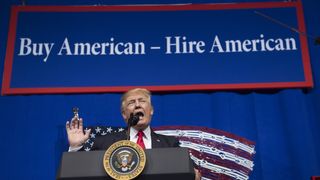From guns to health care, Washington seems more gridlocked and politically divided than ever, yet there’s actually some fairly widespread consensus on at least one issue: China is not playing fairly when it comes to trade.
China has become dramatically more market-oriented than it was when it first joined the World Trade Organisation (WTO) in 2001, yet Beijing’s acceding to the premier international organisation addressing international rules of trade has not coincided with China becoming market-oriented enough. Today, China maintains significant government involvement in the economy – ranging from subsidies and the supporting of dumping cheap goods abroad to enacting significant tariffs on foreign imports.
The major divergence in Washington – and where the Trump administration is upending the rules based order – is over how to address that.
Both Obama and Bush administrations took on China within the multilateral WTO framework to reign in Beijing’s unfair practices. Within this framework all countries would collectively enact retaliatory measures against any country deemed to be engaging in unfair practices.
The Trump administration, on the other hand, has taken a unilateral approach that violates the multilateral WTO system in either letter or spirit by invoking the WTO national security exception in bad faith with its enacting tariffs on steel and aluminium and then its expected tariffs on Chinese imports in the near future.
The Trump administration is also actively blocking judicial appointments to the WTO’s Appellate Body, which has the important role of settling international trade disputes. The one function of the WTO that has been lauded more than any other for preventing trade wars and maintaining the rules based system for trade, the Appellate Body may simply not have enough judges to exist by 2019.
As one European report adroitly said: “Trump is making a cynical calculation that US is the world’s No.1 economy and can outmuscle any opponent in a trade dispute, without the need for international arbitration. In a world that returns to the law of the jungle, Trump reckons he wins.”
From its sluggish pace in adopting new trade measures – it has been stuck on the latest round of negotiations since 2001 – to the uncomprehensive means of addressing mercantilist tendencies, the WTO system is undoubtedly an imperfect one. It is also the only global trade system available. Yet, instead of trying to improve the WTO or create a new system to raise the standards of international trade, such as joining the Trans Pacific Partnership (TPP), the Trump administration is seeking to throw the baby out with the bathwater and perhaps even the whole bathroom for that matter.
From the US withdrawal from the TPP and Paris Climate Accords to the dismantling of the US diplomatic corps, many US allies have maintained a strategy of trying to minimise Trump’s disruptions while praying that the next administration will be more reasonable and stable. Trump’s threats to the rules-based order on trade, also known as the WTO, make such a strategy impossible.






